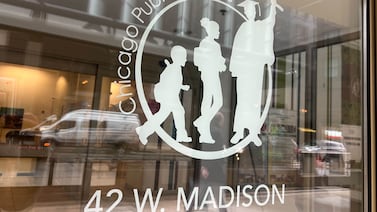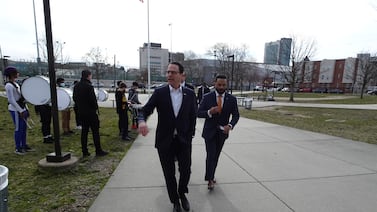Systematic antibody testing will be an important pillar of reopening schools in the fall, Mayor Bill de Blasio said on Thursday. Yet, as New York City ramps up such testing to get a better handle on how many people have been exposed to COVID-19, those plans do not include educators at this point.
The city is partnering with the federal government to test 140,000 first responders and healthcare workers for antibodies. On Thursday, the mayor announced those efforts would also extend to the general public, with capacity to test 5,000 people a day at sites across the five boroughs.
But plans to test educators and school communities have not yet been outlined for the country’s largest school system, with more than 1 million students and 75,000 teachers.
“A world I would like to get to is one where there’s maximal testing available for school communities, to give people confidence that they can come back into the school community and know what’s really going on,” the mayor said. “What that looks like, when that can be done, how that can be done — those are blanks that we need to fill in.”
Antibody testing has proven largely unreliable, and the U.S. Food and Drug Administration has moved to crack down on companies providing them. De Blasio said the city would only be using tests that officials are confident are more accurate.
No one knows for sure whether having antibodies means people are immune from the disease. Still, the results could go a long way towards helping build public confidence in reopening society — including schools.
James Kemple, director of New York University’s Research Alliance for New York City Schools, said investing in data collection is important to help answer questions about which students, teachers, and administrators can safely return to shared spaces.
“Among the most egregious shortcomings of the country’s response to COVID-19 has been a lack of data about the virus’ spread,” he wrote to Chalkbeat. “The [New York City Education Department] will need to avoid this problem if it is to make informed decisions about how to reopen schools and address the dual priorities of ensuring health and safety and meeting students’ educational needs.”
Widespread and reliable testing are just some of the conditions necessary to reopen schools.
The safety of the subway system is also a major consideration, with scores of teachers and students relying on public transportation to get to class, de Blasio said Thursday. This week, the city began shutting down trains overnight for the first time in history so they can be disinfected. While those no-service hours don’t affect the school day, concerns abound about the subway’s role in spreading the virus.
The mayor said the key to getting both transportation and schools running normally is to continue with social distancing measures.
“It’s absolutely hard to have the full reopening of schools without the subway system being available to students and people who work in schools,” de Blasio said. “There’s a deep interconnection, and I think the job is to get those pieces to align through the hard work we’re doing now.”







